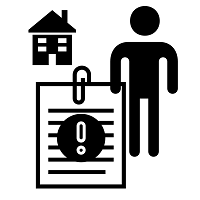Gas and Electric
Gas and electric are two important sources of power and heat. If you are having trouble paying your gas or electric bill, programs exist that may be able to help.
Finding payment assistance

The Low Income Home Energy Assistance Program (LIHEAP) provides a one-time payment to a utility company on behalf of certain qualified households to help cover their heating costs. When you apply for LIHEAP you also apply for the Weatherization Assistance Program, which helps to address issues with your home that are causing high gas and electric bills, like an attic space without good insulation.
LIHEAP and the Weatherization Assistance Program have income limits. The Iowa Community Action Association provides a helpful chart that identifies income limits for both programs (look for the columns with *LIHEAP and *WAP). Benefits.gov also has an eligibility tool to help you determine if you may be eligible for LIHEAP.
To apply for LIHEAP and the Weatherization Assistance Program, contact your local Community Action Agency. Your local Community Action Agency may also be able to provide information on other programs that could assist you, such as programs through your local government.
Negotiating a payment plan
If you are not able to make your gas or electric payment, your utility company must offer you a reasonable payment agreement, although there are limits to what the utility company is required to offer you.
Before you enter into a payment plan with the utility, know that if you do not make the payments you promise, the utility can shut off your service with just one day’s notice, unless you pay the money you owe or enter into another payment agreement with the utility company.
Iowa Administrative Rule 199-19.4 covers the requirements for these payment plans (called “payment agreements”) for gas providers and Rule 199-20.4 covers the requirements for rate-regulated electric providers. The two rate-regulated electric providers in Iowa are MidAmerican Energy Company and Alliant Energy.
If you and the utility company are not able to agree on a payment plan, the utility company must provide you with a written refusal. Within 10 days of the written notice, you can request help from the Iowa Utilities Board in working out a reasonable payment plan with the utility. During the board’s review of the request, the utility provider is not allowed to disconnect your service. To contact the Iowa Utilities Board, you may call customer service at 877-565-4450 or email customer@iub.iowa.gov.
Avoiding shutoff
There are limited reasons that an electric or gas company can disconnect service without notice, but those reasons are not related to failure to pay your bill. If the electric company plans to disconnect your service because you have not paid your bill, the electric company must provide you with notice. (Remember, if you have entered into a payment agreement with a utility company, as discussed above in "Negotiating a payment plan," and you do not make the payments outlined in the plan, the utility company can shut off your service with only one day's notice.) 
The Iowa Utilities Board provides the following advice for people who receive notice from their gas or electric utility that service will be shut off because of a past due bill:
-
Pay the bill in full; or
-
Enter into a reasonable payment plan with the utility; or
-
Apply for and become eligible for low-income energy assistance; or
-
Give the utility a written statement from a doctor or public health official stating that shutting off your natural gas service would pose an especial health danger for a person living at the residence; or
-
Tell the utility if you think part of the amount shown on the bill is wrong. However, you must still pay the part of the bill you agree you owe the utility.
There are certain times and during certain circumstances where your utility provider cannot shutoff your service for not paying your bill. Examples include:
-
If the temperature is forecasted to be 20°F or colder during the following 24-hour period, including the day your service is scheduled to be shut off.
-
If you have qualified for low-income energy assistance, your utility provider cannot shut off your gas or electric service from November 1 through April 1. Remember, you will still owe money for the service used during this time.
-
If one of the heads of household is a service member deployed for military service, electric service cannot be shut off during the deployment or within 90 days after the end of deployment. The utility provider must be informed of the deployment before the disconnection happens for this exception to apply. Remember, you will still owe money for the service used during this time.
You will find more information about utility shutoff in Iowa Administrative Code Rules 199-19.4, 199-20.4, and 199-27.4 and Iowa Code section 476.20.
For more information, see Iowa Legal Aid’s page “Paying for Utilities.”
